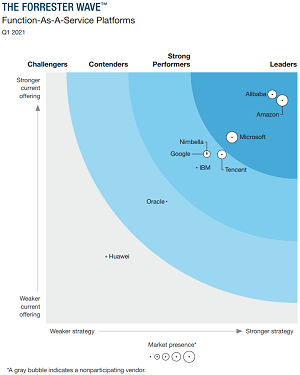News
Azure Named Cloud Functions Leader, but Knocked for Plan Requirements
A new analyst report on serverless cloud-native app development names Microsoft Azure as one of three leaders, touting its "developer experience game" but knocking the platform for putting key enterprise features in advanced plans.
Azure is listed with Amazon Web Services (AWS) and Alibaba as the three "Leaders" in a Forrester Wave Functions-As-A-Service Platforms, Q1 2021 report. It ranks below AWS and Alibaba on the axes that indicate the strength of a current offering and market presence.
The report indicates Azure is strong on the former axis for developers.
"This year, Microsoft has also upped its developer experience game, scoring top marks with investments in onboarding, developer tools support, and support for development and debugging on local machines," the report states.
However, as the bold-text intro lines for each top vendor's profiles below show, the story is different on the plans/features side of things:
- Amazon leads with geographic reach, ecosystem breadth, and steady execution.
- Alibaba uses containers and open standards to accelerate web and content workloads.
- Microsoft Azure Functions reserves important enterprise features for premium plans.
The Azure profile continues: "Azure Functions supports a multitude of programming languages and stateful durable functions in its consumption plan, but preprovisioned instances, docker container support, and robust security features require developers to step up to a premium, dedicated, or Azure App Service plan."
 [Click on image for larger view.] FaaS Platforms (source: Forrester Research).
[Click on image for larger view.] FaaS Platforms (source: Forrester Research).
Robust security is important everywhere, obviously, and container support (usually Docker) is key to cloud-native serverless FaaS development, typically done with microservices that trip off code functions in reaction to different types of events.
Forrester says FaaS platforms abstract the management and scaling of those services and other technologies such as virtualization.
"In return for handing over management of lower-level infrastructure concerns to a FaaS provider, developers get a programming environment that lets them write microservices as small, simple functions in languages they already know like Java, C#, JavaScript, or Python. The FaaS provider then automatically scales these microservices up (and down) as demand for the services dictates."
In a March 30 blog post, Microsoft touted the inclusion of Azure Functions as a leader in the report. "Azure Functions is fully integrated with other Azure services and development tools. Its end-to-end development experience allows you to build and debug your functions locally on any major platform (Windows, macOS, and Linux), as well as deploy and monitor them in the cloud. You can build functions using multitude of programming languages: C#, Node.js, Python, JavaScript, Java, and PowerShell."
About the Author
David Ramel is an editor and writer at Converge 360.